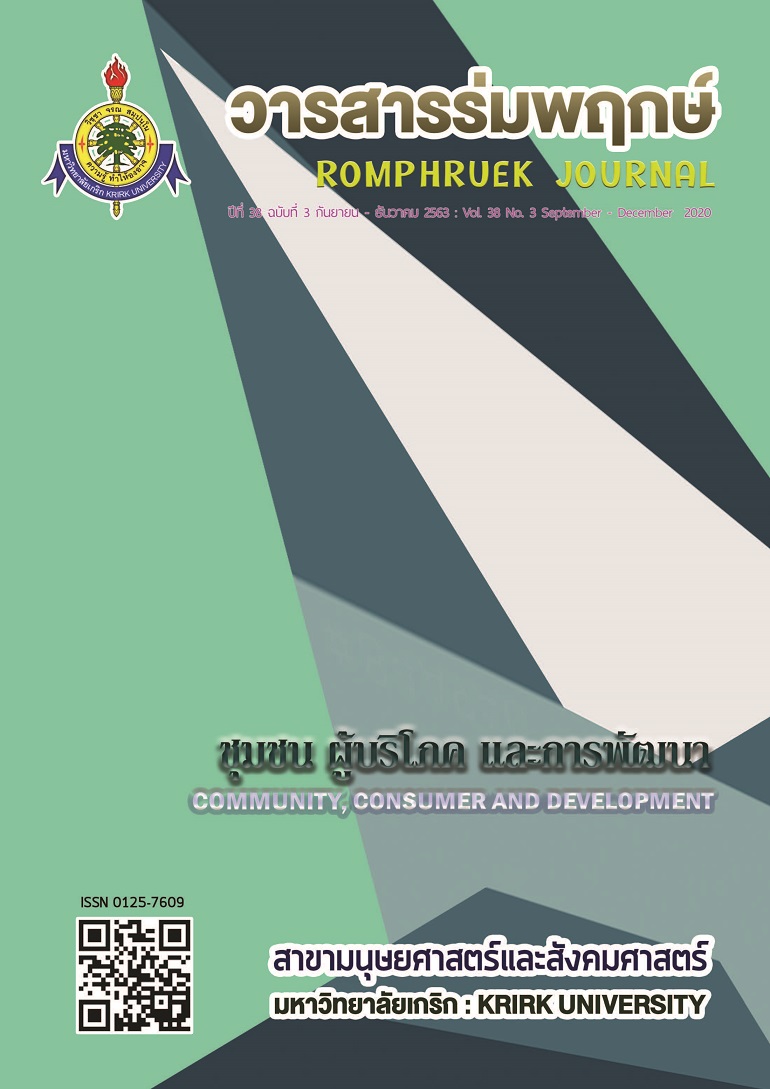锚定效应对消费者购买意愿的影响研究
Main Article Content
บทคัดย่อ
“锚定效应(anchoring effect)”已经成为研究人们需求测量必不可少的工具。目前“锚定效应”多集中在相关范式和锚定类型模型上。实践中,锚定效应对消费者购买意愿的影响及作用机制研究还尚缺。本文基于情境场域的实验,选取某微信团购的210人作为研究对象,其中有效参与人数190人作为统计计量和问卷对象,并分为高锚组98人,低锚组92人,采取以李克特七点量表测量数字从1到7正向计分。探究“锚”对消费者购买意愿的影响因素,以此探究“高锚(high anchoring point)”与“低锚(low anchoring point)”对消费者购买意愿的不同影响,并通过信度和效度的验证,以证明“锚定效应”对消费者购买意愿的作用,在此基础上得出锚定效应对消费者购买意愿影响大的结论,并提出相关的营销策略建议。
Article Details
ทุกบทความที่ตีพิมพ์ในวารสารมนุษยศาสตร์และสังคมศาสตร์ร่มพฤกษ์เป็นทัศนะและข้อคิดเห็นของผู้เขียนมิใช่ทัศนะของมหาวิทยาลัยเกริกหรือกองบรรณาธิการ การนำบทความส่วนใดส่วนหนึ่งหรือทั้งหมดไปพิมพ์เผยแพร่ต้องอ้างอิงที่มาให้ชัดเจน
เอกสารอ้างอิง
Baron, R. M., & Kenny, D. A. (1986). The moderator–mediator variable distinction in social psychological research : Conceptual, strategic, and statistical considerations. Journal of personality and social psychology, 51(6), 1173.
Epley, N., & Gilovich, T. (2001). Putting adjustment back in the anchoring and adjustment heuristic : Differential processing of self-generated and experimenter-provided anchors. Psychological science, 12(5), 391-396.
Tversky, A., & Kahneman, D. (1974). Judgment under uncertainty : Heuristics and biases. Science, 185(4157), 1124-1131.
Wilson, T. D., Houston, C. E., Etling, K. M., & Brekke, N. (1996). A new look at anchoring effects : basic anchoring and its antecedents. Journal of Experimental Psychology : General, 125(4), 387-402.
陈仕华, & 李维安. (2016). 并购溢价决策中的锚定效应研究. 经济研究, 51(6), 114-127.
Chen Shihua & Li Weian. (2016). Study on Anchoring Effects of Acquisition Premiums Decision. Economics Study, 51(6), 114-127.
李斌, 徐富明, 马红宇, & 王伟. (2011). 锚定效应对消费者决策的影响研究述评. 消费经济, 27(05), 94-97.
Li Bin, Xu Fuming, Ma Hongyu, & Wang Wei. (2011). A Review of Research on the Impact of Anchoring Effect
on Consumer Decision. Consumer Economics, 27(05), 94-97.
刘石兰, & 甘艳玲. (2015). 消费者促销预期研究述评与展望. 外国经济与管理, 37(03), 40-52.
Liu Shilan & Gan Yanling (2015). A Literature Review of Consumer Promotion Expectations and Prospects. Foreign Economics & Management, 37(03), 40-52.
罗利, 赵云洁, 肖潇, & 陈溪. (2011). 价格估计中经验对锚定效应的影响. 内江师范学院学报, 26(06), 68-72.
Luo Li, Zhao Yunjie, Xiao Xiao, & Chen Xi. (2011). The Impact of Experience upon the Anchoring Effect in the Price Estimation. Journal of neijiang normal university, 26(06), 68-72.
沈超红, 程飞, & 尉春霞. (2016). 锚定效应与消费者购买意愿关系研究. 消费经济, 32(02), 57-63
Shen Chaohong, Cheng Fei, & Wei Chunxia. (2016). Research on the Relationship between Anchor Effect and Consumers' Purchase Intention. Consumer Economics, 32(02), 57-63.
王琦, 刘凯, & 张晓航. (2016). 卷入情景下特征框架效应对购买意愿的影响. 商业研究, 62(10), 1-9.
Wang Qi, Liu Kai, & Zhang Xiaohang. (2016). Influence of the Attribute Framing Effect on Purchasing Intention under Involvement Scene. Commercial Research, 62(10), 1-9.
张淑惠, & 陈珂莹. (2018). 锚定效应对经济管理决策的影响研究述评. 财会月刊, 2018(10), 125-130.
Zhang Shuhui, & Chen Keying. (2018). A Review of Research on the Impact of Anchor Effect on Economic Management Decision. China Academic Journal Electronic Publishing House, 2018(10), 125-130.


